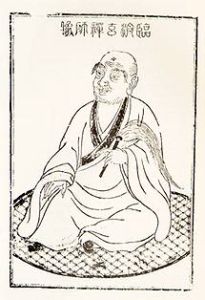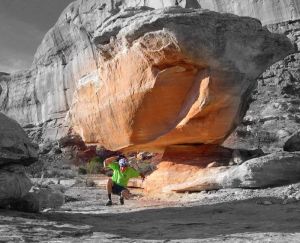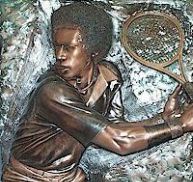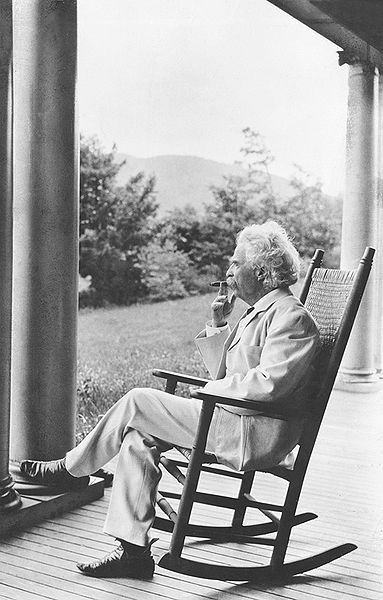April 2007
![]()
Essays, poems, opinions and humor on seeking
and finding answers to your deepest life-questions
|
This month's contents:  Tulips by Ogemaniac
Tulips by Ogemaniac
Transmission by Bart Marshall | Invitation to Adventure by Ernest Shackleton | Poems by Shawn Nevins | Egoless Vector by Arthur Ashe | Working Within by Bob Fergeson | Pride & Precipice by Art Ticknor | Inspiration, Intention & Commitment by Art Ticknor | Humor
|
Transmission
by Bart Marshall
In Zen, the word transmission is used to denote the "passing on" of enlightenment through a master-student relationship. It is misleading, in that it implies an energy transference in which enlightenment flows from someone who "has" it to someone who does not.
Still, there's really no better word for what Zen points at with transmission. Enlightenment cannot be "taught" like mathematics or language, or mastered with "practice," like art or music. The Zen master's task is more akin to helping someone born with no sense of humor suddenly break into an uncontrollable belly laugh. Or to trigger in a self-absorbed ego-maniac a spontaneous experience of unconditional love. One never makes "progress" towards this sort of thing. It could happen any moment, or never. And so when Truth stands revealed, it is said transmission has occurred.
Within that metaphor, however, it is perhaps more accurate to say that transmission is occurring always. God, Tao, the One, the Source, the Absolute—whatever we might call it—is in an unceasing state of transmission. Awakening is when reception occurs. (Although this, too, is misleading since there is no receiver.)
 God's eternal state of transmission is a standing "invitation to receive" that may be accepted at any moment—but not by the ego-identity. The
ego-mind—even one that has spent years "seeking enlightenment"—treats the invitation to receive transmission as a threat, as "the hound of
heaven." As long as ego is in control—or believes itself to be—the hound is successfully kept at bay. But if ego is dethroned for
even a moment, the hound is upon it, and its name is Grace. Invitation accepted, transmission complete.
God's eternal state of transmission is a standing "invitation to receive" that may be accepted at any moment—but not by the ego-identity. The
ego-mind—even one that has spent years "seeking enlightenment"—treats the invitation to receive transmission as a threat, as "the hound of
heaven." As long as ego is in control—or believes itself to be—the hound is successfully kept at bay. But if ego is dethroned for
even a moment, the hound is upon it, and its name is Grace. Invitation accepted, transmission complete.
Knowing the ego-identity to be the sole "guardian of the gate," the Zen master—with the permission and complicity of the aspirant—goes about the business of undermining and attacking its "authority" in subtle, and sometimes not-so-subtle, ways.
This is the entire work of Zen. There is no teaching or practice, no zapping, no secret wisdom imparted with words—or rather, whatever there is of this is not the point. The Zen master is up to one thing only—the maneuvering of the seeker's ego-mind into a sufficiently vulnerable position that it might falter just long enough for reception to occur.
The master transmits nothing. He does not "have" enlightenment (no one ever has) so what could he transmit? He is a midwife, a facilitator, an "awakening therapist."
All rests with the aspirant. The Source is as unavoidable as air—the very "space" you now take in. How close is the place you peer out from? How far from it could you stray? To "see" it where do you look? To "know" it where do you go?
![]()
See Bart's sites Richard Rose: Zen Master - Poet - Philosopher - Friend and Raleigh Self-Inquiry Discussion Group.
![]()
Invitation to Adventure
Ad reportedly placed in London newspapers circa 1914. Five thousand men replied according to one account. From "Character Is Destiny" by John McCain. |
Poems
by Shawn Nevins
|
A prairie warbler's song circles higher and higher. Why we need these opening acts Perhaps the warbler's song and dragonfly's wings
Come night, we are willing to feel what we cannot see.
Shadow man,
A cruising car and a cawing crow
"Odds" Lay down your cards - |
![]()
Egoless Vector
|
Working Within
by Bob Fergeson
"How then can we change being? By applying the knowledge of the Work through self-observation to ourselves. And remember that you do not change by being told what to do. You only change through seeing what you have to do when you realize what your being is like." —Maurice Nicoll
 Photo: Bob Fergeson
Photo: Bob Fergeson
Sooner or later the task of changing our being, of becoming, moves from simple mental learning through advice and association to the inner task of developing the intuition. How well this works is ultimately about how well we can hold tension and work within. The practical thing to "do" then becomes the real time observation of our own attention. The work moves within, and is no longer about character building, a better personality, becoming charismatic or invisible. There are several ways to describe this simple trick of watching or chasing your attention: the experiments of Douglas Harding, which show how to look at what you are looking out of, learning to listen with the eyes, to listen with the attention, the two-way seeing or self-remembering of Gurdjieff and the double-pointed arrow of attention, one pointed within, one without, and the art of mindfulness. To be successful in these tricks, we must be able to relax for at least a second from constantly and unconsciously upholding our sense of self. This split second of seeing who or what we really are, is our slipping behind the mind or ego and seeing through it rather than as it. Now, if you have trouble practicing experiments of the type listed above, or are unable to catch the meaning behind them, why is this? What's blocking you?
The ego1-ego2 game is a great enemy in direct seeing. When the exercises are practiced, the ego-mind is rendered quiescent, if only for a split second, but long enough for one to be free from the mind's pressure to create, project and solve problems, drama, or conflicts, such as getting what you want, avoiding what you fear, etc. But in the next instant after the "seeing" has ended, the mind will rise up and become active once more and the ego-self, largely through memory, will then lay claim to the credit of seeing, dragging us out of eternity and taking away any incentive to actually "see" again. An insidious trick has just been played on us, for the ego, as ego1, has just laid claim to "seeing," and places all blame for actions opposed to seeing on a fictitious character it creates and then uses as scapegoat: the hapless ego2. Thus, we are taken out of action and thrown back where we started: identified with the mind in time. Seeing is now relegated to memory only, for we are unconscious of the whole above trick. The ego has thus kept its throne, and we, as awareness, are back asleep.
If we get what's taking place in the above experiments (by seeing it, rather than mentally understanding it), then our intuition will know what to do next, knowing now what the attention is and how it moves from one view to another. Here's a test to see if we really do see this:
Look at a familiar object, say a tree out of your window, and watch the mind as it works. Observe how this mind associates the tree with names, memories, information, etc. Notice how it does this automatically, unquestioned. Now, practice two-way seeing, the listening attention, while looking at the tree. Allow yourself to look back at what you are looking out of, the aware silence, and look forward or out at the object as well. Can you now look at the tree without "knowing" what it is? Without knowing what you are, simply because you are? The mind is now silent and all is okay, for nothing is separate. No separation of things, no creating of things, is needed; no labeling or judging, qualifying or describing. You are not enlightened or ignorant, for you have no need to create yourself or "be" anything.
Now, while still observing the tree, allow the mind to work, as it rises up and again starts the process of creating objects with characteristics, separating "you" from the "tree," and separating the tree from everything else, as the string of associated concepts stream forth. Can you see the difference between these two states? Can you see your attention move between these two views? Can you be honest about this? Does your heart have anything to say about value and meaning in relation to these two very different states?
If you can't "do" the above experiment, or dismiss it as unimportant, what is blocking you? Why is your intuition being shut out, and thus not picking up on this? If you think the above is not important, or can't relate to it, and still insist on someone or some system telling you something practical to do as a spiritual exercise, or if you are honest and admit you just can't follow any of it, the reason lies within, in something blocking you. Perhaps an energy knot in the emotions, most likely hidden, unconscious, but active and alive. This knot blinds as well as binds you to it, keeping you unconscious, so as to maintain the status quo of the tension and energy system of knots known as "you."
If seeing still makes no sense, and you are at a loss as to practical method and the next move on your path, this then is what you can do: become conscious of what is blocking your intuition. Perhaps going back through your life story with its accompanying emotions is in order, to free you of the energy knots that bind your attention. What needs to be done will be seen, if steps are taken to improve the intuition, clarify one's values, and to hold and increase the tension of questioning, of looking. Taking advice and direction from outside as an easy way out of the tension of having to develop one's own intuition ends in robbing one of the grace that comes from within.
![]()
See Bob's web sites The Mystic Missal, the Nostalgia West photo site, and The Listening Attention
![]()
Pride & Precipice
|
![]()
Inspiration, Intention & Commitment
by Art Ticknor
Many of my younger friends are afraid of commitment to a spiritual path. They worry about making a wrong choice and cutting themselves off from all the pleasures they assume such a commitment would eliminate. They typically develop the sense of a dichotomy between spiritual work—i.e., defining the self, answering the "Who am I?" question—and "living life," by which they mean pursuit of games other than the Master Game.
 Credit: Paul Brennan/public domain
Credit: Paul Brennan/public domain
This is not said to knock their seriousness or their effort, which impress me. But in the dimension of duality where our attention is captive until we cut the Gordian knot, we cannot transcend contradictions. We can't both eat our cake and have it remain uneaten.
The serious young seeker on a "qualified" spiritual path, a project that's not whole-hearted, may become expert at seeing both sides of any issue as having equal value and thus be unable to distinguish the more true from the less true. Introspection may bring the seeker to the point of seeing that thought and decision-making are automatic processes within the mind. Or an internal "voice" may tell the seeker that he's powerless to choose or to act. In various ways the uncommitted seeker may arrive at an obstacle that leads to temporizing and then giving up the search.
Richard Rose said he became determined, as a young man with soft features, never to let anyone intimidate him. When I met Rose, I found the missing purpose and meaning that I'd been searching for during the previous ten or twelve years. Shortly afterward I made a commitment to become the Truth regardless of the cost. Over the following years there were several times when I renewed the commitment, sometimes finding new words to footnote or refine my understanding of it. I remember clearly one instance, which occurred when I was on a solitary retreat and read a remark made by Ramana Maharshi that inspired me: to obey the Lord in thought, word and deed. It expressed a deep need or desire—and the reason I recall this so clearly is because it was the first time that I felt inspired to make a commitment when I also felt the necessity of making a serious scan of my mind to be sure there were no reservations.
It was almost only during such solitary retreats where I experienced inspiration, which I attribute to the fact that my mind only relaxed sufficiently during those times. And my impression is that it was only when I felt inspired—which would come to me as if my insides were filled with champagne-like bubbles—that I could make commitments. But I can see that it's misleading when I describe that to my young friends. Commitment isn't something you force yourself into or trick yourself into. It's basically finding words that express an inner yearning and an intuitive reading of a desired intention. I believe that's what motivated both Rose's determination and my commitment in the examples mentioned above.
I was always irritated when I heard or read the advice that all a seeker needs for success is x or y. "Earnestness" or a "pure intention" were among the two most irritating to me. But here's my attempt: all a seeker needs for success is whatever motivates him to persist.
![]()
Humor at Seventy ...At a party for his seventieth birthday, Samuel Clemens (Mark Twain) said he had reached his lofty age "by sticking to a scheme that would kill anybody else":
From Character Is Destiny by John McCain. |
Reader Commentary ...
(We appreciate hearing from you.)
|
Sign up for our e-mail alert that will let you know when new issues are published. Contact the Forum for questions, comments or submissions. Want to help? Your donation of $5 or more will support the continuation of the Forum and other services that the TAT Foundation provides. TAT is a 501(c)(3) not-for-profit educational organization and qualifies to receive tax-deductible contributions. Or, download this .pdf TAT Forum flyer and post it at coffee shops, bookstores, and other meeting places in your town, to let others know about the Forum. |


 MEN WANTED: FOR HAZARDOUS JOURNEY. SMALL WAGES, BITTER COLD, LONG MONTHS OF COMPLETE DARKNESS, CONSTANT DANGER,
SAFE RETURN DOUBTFUL. HONOR AND RECOGNITION IN CASE OF SUCCESS. ~SIR ERNEST SHACKLETON
MEN WANTED: FOR HAZARDOUS JOURNEY. SMALL WAGES, BITTER COLD, LONG MONTHS OF COMPLETE DARKNESS, CONSTANT DANGER,
SAFE RETURN DOUBTFUL. HONOR AND RECOGNITION IN CASE OF SUCCESS. ~SIR ERNEST SHACKLETON
 Those who are superior in their own eyes,
Those who are superior in their own eyes, I made it a rule to go to bed when there wasn't anybody left to sit up with; and I have made it a rule to get up when I had to.
I made it a rule to go to bed when there wasn't anybody left to sit up with; and I have made it a rule to get up when I had to.